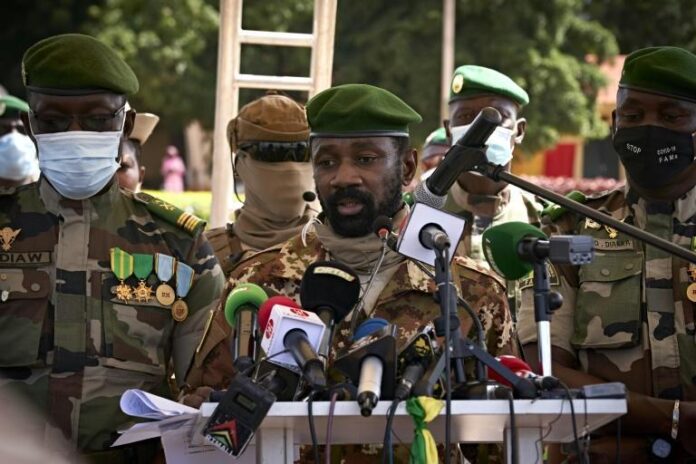Mali in turmoil as strongman ousts transitional leaders Assimi Goita led a coup last August that overthrew Mali’s elected president, Ibrahim Boubacar Keita
Political turmoil in Mali deepened Tuesday as the country’s strongman pushed out transitional leaders who had been tasked with steering the return to civilian rule after a coup last August.
Assimi Goita, who headed a junta which seized power less than 10 months ago, said that President Bah Ndaw and Prime Minister Moctar Ouane had been stripped of their powers, and he promised elections in 2022.
The announcement marks the latest crisis to hit the vast, impoverished West African country, which is already struggling with a brutal jihadist insurgency.
Ndaw and Ouane have been heading an interim government that was installed in September under the threat of regional sanctions, with the declared aim of restoring full civilian rule within 18 months.
In a move that sparked widespread diplomatic anger, the pair were detained on Monday by army officers who were disgruntled by a government reshuffle, two senior officials told AFP.
In a statement read on public television, Goita said Ndaw and Ouane had been stripped of their duties for seeking to “sabotage” the transition, which would “proceed as normally.”
“The scheduled elections will be held in 2022,” he said.
Former colonial power France condemned what it called a “coup”, with Foreign Minister Jean-Yves Le Drian demanding the release of the president and prime minister.
Monday’s government reshuffle, designed to respond to growing criticism of the interim government, saw the military keep the strategic portfolios it controlled during the previous administration.
But two other coup leaders — ex-defence minister Sadio Camara and ex-security minister Colonel Modibo Kone — were replaced.
Colonel Goita, who holds the rank of vice president in the transitional government, accused Ndaw and Ouane of failing to consult him on the reshuffle.
“This kind of step testifies to the clear desire of the transitional president and prime minister to seek to breach the transitional charter,” he said, describing this as a “demonstrable intent to sabotage the transition”.
The transitional charter, a document largely drawn up by the colonels, sets down principles for underpinning Mali’s return to civilian rule.
The detention of Ndaw and Ouane sparked international condemnation, which included a rare joint statement by the United Nations, African Union (AU), Economic Community of West African States (ECOWAS), the European Union and the United States.
UN Secretary-General Antonio Guterres tweeted a call for calm, and urged the leaders’ “unconditional release”.
AU head Felix Tshisekedi, who is also the president of the Democratic Republic of the Congo, echoed the call, saying he “strongly condemned any action that aims to destabilise Mali”.
– Brewing crisis –
Young military officers ousted the then president, Ibrahim Boubacar Keita, on August 18 after weeks of mass demonstrations over perceived government corruption and his handling of the jihadist insurgency.
ECOWAS, a 15-nation regional bloc, threatened sanctions, prompting the junta to hand power to a caretaker government that pledged to reform the constitution.
Goita was appointed as vice president of the caretaker administration, and the president, Ndaw, is a retired army officer.
But many have doubted whether the military-dominated government had the will — or the ability — to stage reforms on a short timescale.
Among other problems, the nation faces a major logistical and security challenge as swathes of territory are in the hands of jihadists.
– Public discontent –
Monday’s reshuffle came amid signs of growing public discontent.
The opposition M5 movement — which spearheaded protests against Keita in 2020 — urged dissolving the interim government and demanded a “more legitimate” body.
On May 14, the government said it would appoint a new “broad-based” cabinet.
In the streets of Bamako, life seemed to continue as normal despite the ouster of Ndaw and Ouane, and many people interviewed by AFP said they were resigned to events.
“There was what happened in August and now we have this, but in real terms, it’s none of our business,” said Fatou Diakite, a doughnut seller wearing a purple head dress. “If I stop working, how do I live?”
Toumani Tangara, a 67-year-old former artilleryman, said “the military’s job is to fight. Let them go to the front, let them free (the north of the country) which is in the hands of terrorists! The rest is nonsense.”
Tahirou Bah, a civil society activist, attacked “putschist colonels…. (who) fight to the death for power” at a time when “80 percent of our country is under the control of terrorists, drug traffickers and bandits of every kind.”
But, he said, many people simply focussed on day-to-day living — “This is survival for many Malians.”
AFP


